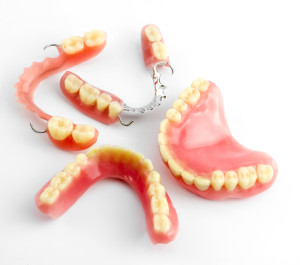 Oftentimes, the mark of good dental work is that nobody can tell it happened. So, when you have questions about what it really feels like to have dental work done, you may not know who to ask! Today, the experts from GPS Dental are here to prep you for your first dentures.
Oftentimes, the mark of good dental work is that nobody can tell it happened. So, when you have questions about what it really feels like to have dental work done, you may not know who to ask! Today, the experts from GPS Dental are here to prep you for your first dentures.
Getting Dentures Takes a While
Getting dentures is not a quick process. Once you and your dentist have decided that dentures are the right course of action for you, you’ll need to have any problem teeth removed. After your mouth has fully healed from that procedure, you will begin the process of fitting your dentures, which usually takes somewhere around five visits. Your dentist may give you a temporary set of dentures, usually called a flipper, soon after your teeth are removed. This is not a permanent solution and is usually used for cosmetic reasons.
At GPS Dental, we offer the option for immediate dentures – so you walk out with your new teeth in place the same day. However, Dr. Skrobanek often needs to adjust these dentures in a follow-up visit, as your mouth will feel and fit differently after it has fully healed. Learn more about our denture options here.
You’ve Still Got to Visit Your Dentist
Your new teeth still need attention and care from your dentist. You’ll have to visit several times to get your dentures made and properly fitted. After that, we recommend checkups at least once or twice a year (the same recommendation we make for anyone else). However, each patient is different, and your dentist may recommend you come in more often.
Wondering when you should visit your dentist? Find out why we suggest you go before the end of the year.
Dentures Can Be Complete or Partial
Despite what cartoons may lead you to believe, dentures are not an ‘all or nothing’ sort of thing. When possible, it’s preferred to keep some natural teeth to help keep dentures in place and disperse the pressure on your jaw more naturally when chewing. Terms you might hear when discussing partial dentures, better known as ‘overdentures,’ include Nesbits (replacement molar teeth), and flippers (temporary dentures that are only used until permanent dentures are ready). Sometimes, partial dentures are cemented in place, known as bridges, and these require nearby natural teeth for support, while other partial dentures are completely removable.
Dentures Shouldn’t Be Uncomfortable
Advanced technology and knowledge means dentures today are better than ever. When you first get your dentures they may rub or irritate your gums, and this just means your dentist should adjust them. While your dentures might feel unusual or unnatural at first, they shouldn’t hurt you. Dentures are made to fit into your mouth, but every mouth is different and sometimes it takes a couple of tries to get your dentures fitted correctly. After all, your mouth is exceptionally sensitive, so small gaps can cause major discomfort.
It Takes Practice
Even with today’s advancements, dentures feel weird, and it may take a little while for you to get used to them. There’s a learning curve to everyday activities like eating. You might need to make adjustments in the beginning like, cutting food into smaller bites, for example. If you feel self conscious about speaking with your new dentures, just keep practicing (try talking to your pets or sing along to the radio). The muscles in your mouth will need to learn the difference in weight and spacing, minute as the changes may seem. Relax and give yourself time to figure it all out. Remember, if your dentures are constantly slipping or still irritating your mouth after a couple of weeks, visit your dentist to make sure they fit like they should!
Getting dentures can be a scary thought, but as with most fears, the more you know, the less frightened you’ll be. If you have any questions or concerns we didn’t answer, or if you’re looking for a dentist you can trust to walk you through getting your dentures, call Dr. Skrobanek with GPS Dental at (210) 633-3477.







